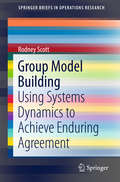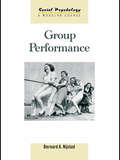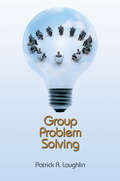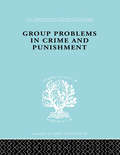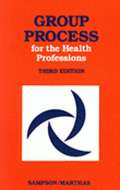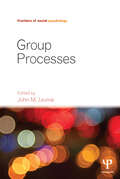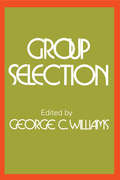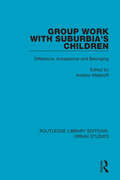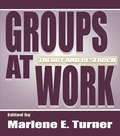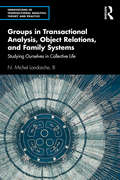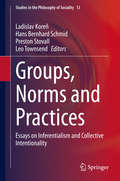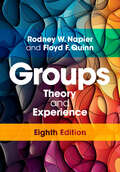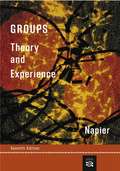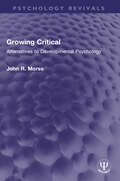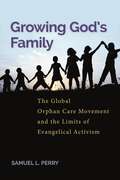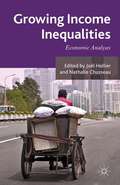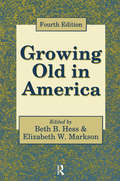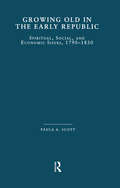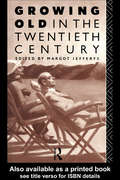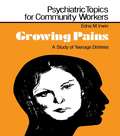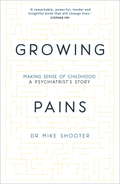- Table View
- List View
Group Integration and Multiculturalism
by Dan PfefferWith immigration fulfilling the role of population maintenance and growth in many Western democracies, how should these countries incorporate newcomers? This book argues that states ought to promote group integration for communities that have settled through immigration. Pfeffer defines group integration as the process through which communities develop lobbies and institutions that represent the group's perspective, and help it to enter into dialogue with their receiving society. With examples from throughout Europe and North America, the justice-based argument suggests that states should facilitate group integration since it improves, among other things, the democratic participation of groups.
Group Model Building: Using Systems Dynamics to Achieve Enduring Agreement (SpringerBriefs in Operations Research)
by Rodney ScottThis book describes the cognitive and interpersonal effects of group model building, and presents empirical research on what group model building achieves and how. Further, it proposes an integrated causal mechanism for the effects on participants. There have been multiple previous attempts at explaining the effects of group model building on participants, and this book integrates these various theories for the first time.The causal mechanisms described here suggest a variety of design elements that should be included in group model building practice. For example, practitioners typically try to reduce complexity for clients, to make the process feel more accessible. In contrast, the findings presented here suggest that the very act of muddling through complexity increases participants’ affective commitment to the group and the decisions made.The book also describes implications for theory and practice. System dynamics has traditionally been interested in using technical modeling processes to make policy recommendations. Group model building demonstrates that these same techniques also have implications for group decision making as a method for negotiating agreement. The book argues for the value of group model building as a mediating or negotiating tool, rather than merely a positivist tool for technical problems.
Group Performance
by Bernard A. NijstadPeople interact and perform in group settings in all areas of life. Organizations and businesses are increasingly structuring work around groups and teams. Every day, we work in groups such as families, friendship groups, societies and sports teams, to make decisions and plans, solve problems, perform physical tasks, generate creative ideas, and more. Group Performance outlines the current state of social psychological theories and findings concerning the performance of groups. It explores the basic theories surrounding group interaction and development and investigates how groups affect their members. Bernard A. Nijstad discusses these issues in relation to the many different tasks that groups may perform, including physical tasks, idea generation and brainstorming, decision-making, problem-solving, and making judgments and estimates. Finally, the book closes with an in-depth discussion of teamwork and the context in which groups interact and perform. Offering an integrated approach, with particular emphasis on the interplay between group members, the group task, interaction processes and context, this book provides a state-of-the-art overview of social psychological theory and research. It will be highly valuable to undergraduates, graduates and researchers in social psychology, organizational behavior and business.
Group Problem Solving
by Patrick R. LaughlinExperimental research by social and cognitive psychologists has established that cooperative groups solve a wide range of problems better than individuals. Cooperative problem solving groups of scientific researchers, auditors, financial analysts, air crash investigators, and forensic art experts are increasingly important in our complex and interdependent society. This comprehensive textbook--the first of its kind in decades--presents important theories and experimental research about group problem solving. The book focuses on tasks that have demonstrably correct solutions within mathematical, logical, scientific, or verbal systems, including algebra problems, analogies, vocabulary, and logical reasoning problems. The book explores basic concepts in group problem solving, social combination models, group memory, group ability and world knowledge tasks, rule induction problems, letters-to-numbers problems, evidence for positive group-to-individual transfer, and social choice theory. The conclusion proposes ten generalizations that are supported by the theory and research on group problem solving. Group Problem Solving is an essential resource for decision-making research in social and cognitive psychology, but also extremely relevant to multidisciplinary and multicultural problem-solving teams in organizational behavior, business administration, management, and behavioral economics.
Group Problems in Crime and Punishment (International Library of Sociology #No. 117)
by Hermann MannheimFirst published in 1998. Routledge is an imprint of Taylor & Francis, an informa company.
Group Process for Health Professions
by Edward E. Sampson Marya MarthasPresenting a well-balanced blend of theory and practice, this exciting book helps the health care professional develop the skills needed to work effectively in small groups. In clear, concise language, the text introduces the fundamental theories, concepts, issues, and approaches needed for individuals to work successfully in groups.
Group Processes (Frontiers of Social Psychology)
by John M. LevineIt is impossible to understand human behavior without understanding the critical role that groups play in people’s lives. Most of us belong to a range of formal and informal groups, including families, work teams, and friendship cliques. These groups absorb a great deal of our time and energy and are instrumental in satisfying our most fundamental needs. In addition, they connect us to larger social aggregates (e.g., political parties, business organizations, religious denominations) that influence our lives in important ways. This volume provides a comprehensive overview of classic and contemporary issues in the field of group processes. Chapters are written by internationally known experts who have made major theoretical and empirical contributions to the study of groups. The broad and up-to-date coverage of the book makes it an essential resource for advanced undergraduates, graduate students, researchers, and practitioners. The volume will be of interest to scholars in various disciplines, including social and organizational psychology, sociology, communication, economics, and political science.
Group Selection (Controversy Ser.)
by George C. WilliamsLiving things are constantly engaged in a struggle for existence, and ingenious devices for the purpose of self-preservation can be seen in all types of animal and plant life. However, nature also displays phenomena that are not related to survival or that seem clearly to violate the principle of self-preservation - particularly when organisms interact with one another. Darwin investigated these apparent contradictions and proposed that both mechanisms of self preservation and those of reproduction are explained by a more basic principle of "natural selection" - the reproductive survival of the fittest. George C. Williams in "Group Selection" challenges the adequacy of this process of selection at the individual level.Williams has here collected the work of the chief partisans with opposed viewpoints on the theory of selection at the group level to state their arguments and rebuttals. A minority of modern biologists offer evidence to show that groups of living things are organized to assure their collective survival; they are not merely collections of individuals designed for their own survival and reproduction. In opposition, defenders of the traditional point of view charge that mechanisms of group survival are based on illusion and misinterpretation.Because of the wide range of opinion expressed in "Group Selection", the reader is exposed to all sides of the dispute and encouraged to form his or her own views. In addition, as a source book on current evolutionary issues or for research or reference material, "Group Selection" remains a valuable addition to every personal and institutional library in the biological sciences.
Group Technology And Cellular
by Ali K. KamraniThis book provides the latest up-to-date documentation on the scope of research in Group Technology (GT) and Cellular Manufacturing (CM). It is a comprehensive listing of the methodologies, techniques, algorithms and tools used for practical implementation of the concepts of GT and CM.
Group Work with Suburbia's Children: Difference, Acceptance, and Belonging (Routledge Library Editions: Urban Studies #18)
by Andrew MalekoffThis collection of articles, first published in 1991, attempts to describe life in the suburbs from diverse vantage points, to evoke a feeling of what life is like for some of the children and their families living in these communities and to demonstrate the practice and value of group work within this context. This title will be of interest to students of social work, sociology and urban studies.
Groups at Work: Theory and Research (Applied Social Research Series)
by Marlene E. TurnerThis book has two purposes. First, it is fundamentally about groups at work, both as they attempt to accomplish their goals and as they operate in organizational settings. Second, it draws together group researchers from social psychological and organizational studies. Each chapter focuses on a central issue regarding groups as they work and examines that issue by drawing from both social psychological and organizational research. Thus, this book centers on the convergence and divergence of these two fields.
Groups in Transactional Analysis, Object Relations, and Family Systems: Studying Ourselves in Collective Life (Innovations in Transactional Analysis: Theory and Practice)
by N. Michel Landaiche, IIIGroups are arguably an essential and unavoidable part of our human lives—whether we are part of families, work teams, therapy groups, organizational systems, social clubs, or larger communities. In Groups in Transactional Analysis, Object Relations, and Family Systems: Studying Ourselves in Collective Life, N. Michel Landaiche, III addresses the intense feelings and unexamined beliefs that exist in relation to groups, and explores how to enhance learning, development and growth within them. Landaiche’s multidisciplinary perspective is grounded in the traditions of Eric Berne’s transactional analysis, Wilfred Bion’s group-as-a-whole model, and Murray Bowen’s family systems theory. The book presents a practice of studying ourselves in collective life that utilizes a naturalistic method of observation, analysis of experiential data, and hypothesis formation, all of which are subject to further revision as we gather more data from our lived experiences. Drawing from his extensive professional experience of group work in a range of contexts, Landaiche deftly explores topics including group culture, social pain, learning and language, and presents key principles which enhance and facilitate learning in groups. With a style that is both deeply personal and theoretically grounded in a diverse range of studies, Groups in Transactional Analysis, Object Relations, and Family Systems presents a contemporary assessment of how we operate collectively, and how modern life has changed our outlook. It will be essential reading for transactional analysts in practice and in training, as well as other professionals working with groups. It will also be of value to academics and students of psychology, psychotherapy, and group dynamics, and anyone seeking to understand their role within a group.
Groups, Norms and Practices: Essays on Inferentialism and Collective Intentionality (Studies in the Philosophy of Sociality #13)
by Hans Bernhard Schmid Ladislav Koreň Preston Stovall Leo TownsendThis edited volume examines the relationship between collective intentionality and inferential theories of meaning. The book consists of three main sections. The first part contains essays demonstrating how researchers working on inferentialism and collective intentionality can learn from one another. The essays in the second part examine the dimensions along which philosophical and empirical research on human reasoning and collective intentionality can benefit from more cross-pollination. The final part consists of essays that offer a closer examination of themes from inferentialism and collective intentionality that arise in the work of Wilfrid Sellars. Groups, Norms and Practices provides a template for continuing an interdisciplinary program in philosophy and the sciences that aims to deepen our understanding of human rationality, language use, and sociality.
Groups: Theory and Experience
by Rodney W. Napier Floyd F. Quinn Matti GershenfeldRetaining the broad yet practical approach of previous editions, this popular textbook has been fully updated with research and theory from the last two decades to guide students through the concepts and principles of group dynamics. It now includes a brand-new introductory chapter, three new chapters on diversity and inclusion, creativity and design, and virtual groups, and dedicated chapters on communication and perception. Each chapter features in-class 'Try this!' activities that promote understanding of practical applications, new case examples from real-world organizations, and enhanced learning objectives to guide readers' learning experience. Hundreds of new studies have been added throughout, and examples consider the effects of the COVID-19 pandemic, remote working, the MeToo movement, social media, climate change, and political polarization. Suitable for both undergraduates and first-year graduates, this textbook is supported by an online test bank, PowerPoint lecture slides, activity worksheets, and suggested additional resources.
Groups: Theory and Experience
by Rodney W. Napier Matti K. GershenfeldGroups includes research on group dynamics and current views on ways to make working in groups more effective. Napier and Gershenfeld present complex concepts in a way that makes them more understandable, recognizing that students are more familiar with the dynamics of individual behavior and building on that knowledge to teach group theory. Case studies provide real-life context and exercises engage students in the learning process by asking them to apply what they learn to their own lives.
Groupthink in Science: Greed, Pathological Altruism, Ideology, Competition, and Culture
by David M. Allen James W. HowellThis book discusses one of the hottest topics in science today, i.e., the concern over certain problematic practices within the scientific enterprise. It raises questions and, more importantly, begins to supply answers about one particularly widespread phenomenon that sometimes impedes scientific progress: group processes. The book looks at many problematic manifestations of “going along with the crowd” that are adopted at the expense of truth. Closely related is the concept of pathological altruism or altruism bias—the tendency of scientists to bias their research in order to further the ideological or financial interests of an “in-group” at the expense of both the interest of other groups as well as the truth. The book challenges the widespread notion that science is invariably a benevolent, benign process. It defines the scientific enterprise, in practice as opposed to in theory, as a cultural system designed to produce factual knowledge. In effect, the book offers a broad and unique take on an important and incompletely explored subject: research and academic discourse that sacrifices scientific objectivity, and perhaps even the scientist’s own ethical standards, in order to further the goals of a particular group of researchers or reinforce their shared belief system or their own interests, whether economic, ideological, or bureaucratic.
Growing Critical: Alternatives to Developmental Psychology (Psychology Revivals)
by John R. MorssOriginally published in 1996, and now with a new preface, Growing Critical is an introduction to critical psychology, focusing on development. It takes a fresh look at infancy, childhood and adulthood and makes the startling claim that ‘development’ does not exist. John R. Morss guides the reader from the early critical movements of the 1970s which gave rise to the ‘social construction of development’ through the wide range of more recent approaches. He looks in turn at Vygotsky’s ‘social context of development’, Harré’s ‘social constructionism’, Marxist critique of developmental psychology, psychoanalytic interpretations of development, and finally post-structuralist approaches following Foucault and Derrida. He surveys the range of alternative positions in the critical psychology of development and evaluates the achievements of Newman and Holzman, Broughton, Tolman, Walkerdine and others. Marxism, psychoanalysis and post-structuralism – as well as such movements as feminism – challenge our understanding of human development. Morss looks beyond the laboratory to Marx and Freud, to Lacan and Foucault. What sets Growing Critical apart from orthodox psychology is the seriousness with which he has thought through the implications of these challenges. Contemporary and ‘reader-friendly’, Growing Critical will be of value to both undergraduate and advanced students, as well as to anyone interested in human development, in psychology, sociology or education.
Growing God’s Family: The Global Orphan Care Movement and the Limits of Evangelical Activism (Alternative Criminology)
by Samuel L. PerryIllustrates the hidden challenges embedded within the evangelical adoption movement. For over a decade, prominent leaders and organizations among American Evangelicals have spent a substantial amount of time and money in an effort to address what they believe to be the “Orphan Crisis” of the United States. Yet, despite an expansive commitment of resources, there is no reliable evidence that these efforts have been successful. Adoptions are declining across the board, and both foster parenting and foster-adoptions remain steady. Why have evangelical mobilization efforts been so ineffective? To answer this question, Samuel L. Perry draws on interviews with over 220 movement leaders and grassroots families, as well as national data on adoption and fostering, to show that the problem goes beyond orphan care. Perry argues that evangelical social engagement is fundamentally self-limiting and difficult to sustain because their subcultural commitments lock them into an approach that does not work on a practical level. Growing God’s Family ultimately reveals this peculiar irony within American evangelicalism by exposing how certain aspects of the evangelical subculture may stimulate activism to address social problems, even while these same subcultural characteristics undermine their own strategic effectiveness. It provides the most recent analysis of dominant elements within the evangelical subculture and how that subculture shapes the engagement strategies of evangelicals as a group.
Growing Income Inequalities
by Joël Hellier Nathalie ChusseauThis book provides an up-to-date survey of existing economic literature on the dimensions of growing income inequalities in both advanced and emerging countries. The different explanations and dimensions of inequalities are addressed, particularly globalization, technical progress, in-work poverty, changes in labour market institutions, education and intergenerational mobility, growth and development. The nine chapters provide simplified models exploring each of these elements, and assess commonly accepted explanations and mechanisms.
Growing Old in America: New Perspectives on Old Age
by Beth B. Hess Elizabeth W. MarksonModern industrial societies are characterized by long-term declines in fertility and steady increases in life expectancy. Together, these trends result in an aging population. The United States is no exception; since 1969 the median age has risen from 29.4 to a projected 36.4 in the year 2000. This fourth edition of the standard reader on the sociology of aging has been completely revised, with 90 percent new material, to reflect new information and new issues in this rapidly developing field. Students and practicing professionals will find it a lively, accessible overview.
Growing Old in the Early Republic: Spiritual, Social, and Economic Issues, 1790-1830 (Garland Studies on the Elderly in America)
by Paula A. ScottThe focus for this study is Connecticut and the city of Hartford. The text explores different themes and experiences of the elderly in Connecticut in the years between 1790 and 1830 The purpose of the book is to record and to illuminate the spiritual and emotional aspects of being elderly, the economic consequences of growing old, and the ways social experience changed with advancing years.
Growing Old in the Twentieth Century
by Margot JefferysGrowing Old in the Twentieth Century investigates many aspects of the current debates raging regarding care and provision for the elderly and the very elderly. It will be invaluable to gerontologists, social policy makers, official and unofficial carers, and anyone involved in health care.
Growing Pains: A Study of Teenage Distress
by Edna M. IrwinFirst Published in 1978. Routledge is an imprint of Taylor & Francis, an informa company.
Growing Pains: Making Sense of Childhood A Psychiatrists Story
by Dr Mike Shooter'A remarkable, powerful, tender and insightful book that will change lives' Stephen Fry'A unique book . . . The stories [Shooter] tells are poignant and powerful testimonies to the resilience of the human spirit' Marjorie Wallace, CBE'Through fascinating case studies, Dr Mike Shooter explores issues such as grief, bullying, family breakdown and self-harm. It's a compelling and fascinating glimpse into his career, but is also full of insights into the minds of children, the struggles of growing up and the challenges of parenting'Max Pemberton, Daily Mail'An excellent read for psychiatrists and other mental health professionals, whether they work with children or adults'MDEdge* * * * * * * * * *Child psychiatrist Dr Mike Shooter sheds light on the painful issues and universal experience of growing up, through the stories of his patients and their families.Growing up isn't easy. We can be at our most vulnerable and confused. And the right help isn't always there when we need it most. For over forty years psychiatrist Mike Shooter has listened to children and adolescents in crisis, helping them to find their stories and begin to make sense of their lives. Mike Shooter's own life has been shaped by his battle with depression. It makes him question received wisdom. He knows labels won't always fit and one diagnosis will not work for all. His patients' stories are at the heart of this book. Mike Shooter shares their journey as, through therapy, they confront everything from loss and family breakdown to bullying, grief and illness. We see how children begin to make breakthroughs with depression or anxiety, destructive, even sometimes violent behaviour.Growing Pains is compelling and compassionate - a book to make us wiser and braver, and to help us see how children's stories can find happier endings.
Growing Pains: Making Sense of Childhood – A Psychiatrist's Story
by Dr Mike Shooter'A remarkable, powerful, tender and insightful book that will change lives' Stephen Fry'A unique book . . . The stories [Shooter] tells are poignant and powerful testimonies to the resilience of the human spirit' Marjorie Wallace, CBE'Through fascinating case studies, Dr Mike Shooter explores issues such as grief, bullying, family breakdown and self-harm. It's a compelling and fascinating glimpse into his career, but is also full of insights into the minds of children, the struggles of growing up and the challenges of parenting'Max Pemberton, Daily Mail'An excellent read for psychiatrists and other mental health professionals, whether they work with children or adults'MDEdge* * * * * * * * * *Child psychiatrist Dr Mike Shooter sheds light on the painful issues and universal experience of growing up, through the stories of his patients and their families.Growing up isn't easy. We can be at our most vulnerable and confused. And the right help isn't always there when we need it most. For over forty years psychiatrist Mike Shooter has listened to children and adolescents in crisis, helping them to find their stories and begin to make sense of their lives. Mike Shooter's own life has been shaped by his battle with depression. It makes him question received wisdom. He knows labels won't always fit and one diagnosis will not work for all. His patients' stories are at the heart of this book. Mike Shooter shares their journey as, through therapy, they confront everything from loss and family breakdown to bullying, grief and illness. We see how children begin to make breakthroughs with depression or anxiety, destructive, even sometimes violent behaviour.Growing Pains is compelling and compassionate - a book to make us wiser and braver, and to help us see how children's stories can find happier endings.

